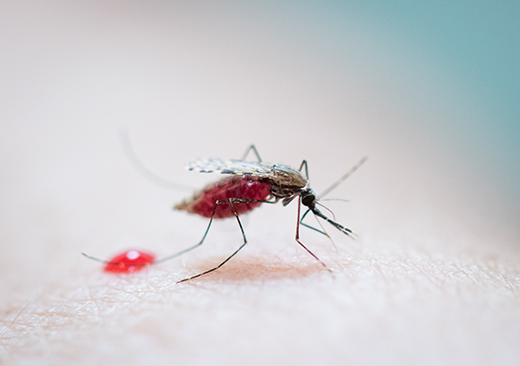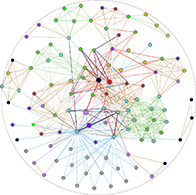Mosquito immunity research gets boost from network science with $2.8 million NIH grant
Thursday, Oct. 18, 2018

A nearly $3 million grant from the National Institutes of Health will help a cross-disciplinary research team led by Kansas State University's Kristin Michel to understand how malaria mosquitoes fend off infections, as well as find a framework for monitoring the immune status of the insect. | Download this photo.
MANHATTAN — Network science may be the answer to understanding how mosquitoes are able to transmit diseases and unveil a framework for biological control of the insect.
Kansas State University's Kristin Michel, associate professor in the Division of Biology, is the principal investigator for a recently awarded $2.87 million National Institutes of Health grant that will use genetics, biochemistry and network science to understand mosquito immune response.
"Mosquitoes have to combat many different types of infection and prevent constant attack from pathogens encountered through their blood meal," Michel said. "At the same time, mosquitoes must be able to regulate their overzealous immune response and prevent it from attacking valid bodily functions. This balance is necessary for any organisms' immune system, including humans."
According to Michel, mosquitoes have more than 7 million potential protein-to-protein interactions responsible for shutting down or activating immune system responses, which provide an ideal system to research how complex information networks function.
"This grant will allow us to get a 30,000-foot view of the mosquito's immune system," Michel said. "We can use network analysis to understand how all these interactions are integrated, visualize the data and make predictions as to how a mosquito's immune system will be activated if we shift the system."
Among the many attempts to control mosquitos as carriers of deadly human pathogens are avenues that can affect the mosquito's immune system, such as entomopathogens, or fungi that act as parasites to kill or disable insects. According to Michel, a better understanding of the mosquito's immune system can help aid decisions for proper biological control of diseases.
Michel is working with Kansas State University's Mike Kanost, university distinguished professor of biochemistry, and Caterina Scoglio, LeRoy and Aileen Paslay professor of electrical and computer engineering; and Mike Osta, associate professor at the American University of Beirut. The interdisciplinary team will help bridge vector biology and genetics with protein biochemistry and computational modeling to answer questions about mosquito immunity.
"This effort requires expertise in multiple scientific disciplines and collaboration to investigate a very complex system by which mosquitoes mount and regulate immune responses to pathogens," Kanost said.
The research will help biologists understand the mosquito's immune system better and advance network science. Computer and mathematical calculations will simulate how proteins are connected during mosquito immune responses to provide an innovative representation of a multilayer network.
"While network analysis of a single-layer is well-studied, the analysis of multilayer networks presents theoretical challenges," Scoglio said. "The goal of our work will be to infer missing links, detect critical protein types, and determine the network robustness."
Mosquitoes' immune systems are made up of a cascade of protein and enzyme reactions, Michel said. Very few of those reactions are understood and may influence other cascades in the system. Network science can help sort out the complexity and visualize the potential for how to interrupt the system.
"In this sea of interactions, or potential interactions, we can use the network analysis to figure out which interactions are really critical to the mosquito's immune response," Michel said. "Then, if we use things in the field to kill mosquitoes, we can make predictions of how the mosquito's immune system would shift from that manipulation."
"This network is crucial in regulating the mosquito immune response to parasites such as those that cause malaria and other microbes," Osta said. "The work will provide novel insights into the immune mechanisms that regulate parasite survival in its mosquito vector."

